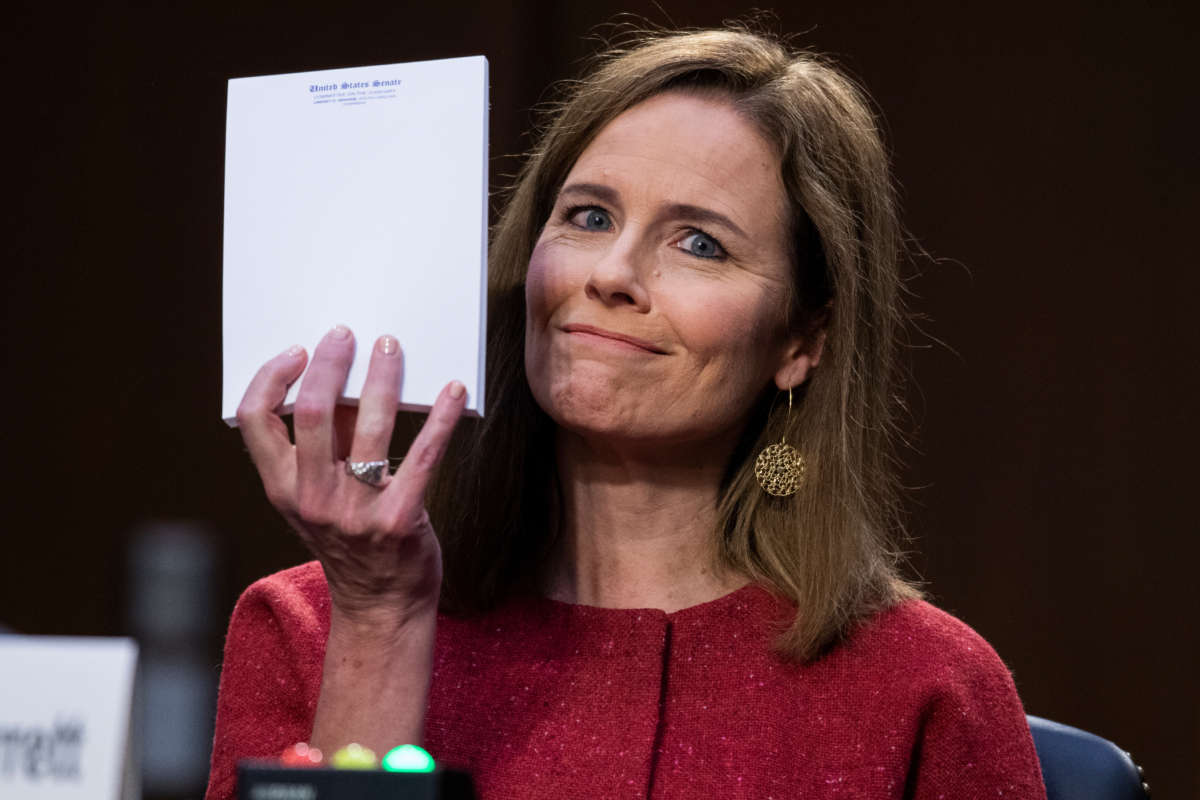Truthout is an indispensable resource for activists, movement leaders and workers everywhere. Please make this work possible with a quick donation.
During confirmation hearings before the Senate Judiciary Committee on Tuesday, Judge Amy Coney Barrett, President Donald Trump’s nominee to sit on the Supreme Court, refused to answer a question regarding the president’s ability to unilaterally delay federal elections set to commence next month.
When asked by the committee’s ranking chair, Sen. Dianne Feinstein (D-California), whether “the Constitution gives the president of the United States the authority to unilaterally delay an election under any circumstances,” Barrett objected to the line of questioning, suggesting that she would have to see the arguments presented before her as a justice on the supreme court before being able to decide.
“If that question ever came before me, I’d need to hear arguments from the litigants and read briefs and consult with my law clerks and talk to my colleagues and go through the opinion-writing process,” Barrett said. “So, you know, if I give off the cuff answers, then I would be basically a legal pundit, and I don’t think we want judges to be legal pundits. I think we want judges to approach cases thoughtfully and with an open mind.”
For someone who is vying to become an interpreter of the Constitution on the nation’s highest court, Barrett’s answer may be troubling to a number of legal scholars, as the ability to change federal election dates rests solely with Congress, and not the executive branch.
“The times, places and manner of holding elections for Senators and Representatives, shall be prescribed in each state by the legislature thereof; but the Congress may at any time by law make or alter such regulations, except as to the places of choosing Senators,” Article I, Section 4 of the Constitution reads.
In 1845, the second clause of that paragraph from the Constitution was invoked, and Congress set the date for federal elections to be the first Tuesday after the first Monday in the month of November. It has remained that way ever since.
The issue over whether a president can delay the election or not came about earlier this year when Trump, citing inaccurate and groundless views about mail-in voting, suggested he might move the date of the election in November in order to address his concerns.
“With Universal Mail-In Voting (not Absentee Voting, which is good), 2020 will be the most INACCURATE & FRAUDULENT Election in history,” Trump wrote in a tweet in July. “It will be a great embarrassment to the USA. Delay the Election until people can properly, securely and safely vote???”
Trump’s views on mail-in voting have been thoroughly debunked on a number of occasions, and election experts largely agree that the practice is not rife with fraud, as Trump has suggested.
Delaying the election was just one of many topics that Barrett refused to take a stance on, even though the established law is very clear on the matter. Earlier in the day, the Supreme Court nominee also refused to answer questions on the landmark abortion rights case Roe v. Wade. Pressed also to give her views on whether intimidation at the polls would be legal or not, Barrett again refused to express an opinion on the matter.
“I can’t characterize the facts in a hypothetical situation, and I can’t apply the law to a hypothetical set of facts,” Barrett said, when asked by Sen. Amy Klobuchar (D-Minnesota) whether she’d uphold laws against voter intimidation. “I can only decide cases as they come to me, litigated by parties on the full record after fully engaging precedent, talking to colleagues, writing an opinion.”
Klobuchar responded to Barrett’s refusal by noting that such laws have “been on the books for decades.”
Holding Trump accountable for his illegal war on Iran
The devastating American and Israeli attacks have killed hundreds of Iranians, and the death toll continues to rise.
As independent media, what we do next matters a lot. It’s up to us to report the truth, demand accountability, and reckon with the consequences of U.S. militarism at this cataclysmic historical moment.
Trump may be an authoritarian, but he is not entirely invulnerable, nor are the elected officials who have given him pass after pass. We cannot let him believe for a second longer that he can get away with something this wildly illegal or recklessly dangerous without accountability.
We ask for your support as we carry out our media resistance to unchecked militarism. Please make a tax-deductible one-time or monthly donation to Truthout.
